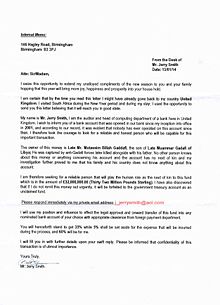This article needs additional citations for verification. (June 2023) |

An advance-fee scam is a form of fraud and is one of the most common types of confidence tricks. The scam typically involves promising the victim a significant share of a large sum of money, in return for a small up-front payment, which the fraudster claims will be used to obtain the large sum.[1][2] If a victim makes the payment, the fraudster either invents a series of further fees for the victim to pay or simply disappears.[3][4]
The Federal Bureau of Investigation (FBI) states that "An advance fee scheme occurs when the victim pays money to someone in anticipation of receiving something of greater value – such as a loan, contract, investment, or gift - and then receives little or nothing in return."[3] There are many variations of this type of scam, including the Nigerian prince scam, also known as a 419 scam. The number "419" refers to the section of the Nigerian Criminal Code dealing with fraud and the charges and penalties for such offenders.[5] The scam has been used with fax and traditional mail and is now prevalent in online communications such as emails.[6] Other variations include the Spanish Prisoner scam and the black money scam.
Although Nigeria is most often the nation referred to in these scams, they mainly originate in other nations. Other nations known to have a high incidence of advance-fee fraud include Ivory Coast,[7] Togo,[8] South Africa,[9] the Netherlands,[10] Spain,[11] and Jamaica.[12][13]
- ^ Lazarus, Suleman; Okolorie, Geoffrey U. (2019). "The bifurcation of the Nigerian cybercriminals: Narratives of the Economic and Financial Crimes Commission (EFCC) agents". Telematics and Informatics. 40: 14–26. doi:10.1016/j.tele.2019.04.009. S2CID 150113120.
- ^ Lazarus, Suleman (2019). "Where is the Money? The Intersectionality of the Spirit World and the Acquisition of Wealth". Religions. 10 (3): 146. doi:10.3390/rel10030146.
- ^ a b "Advance Fee Scams". Archived from the original on 1 November 2019. FBI.
- ^ "advance fee fraud | Definition, Solicitation, & 419 Fraud Definition | Britannica Money". www.britannica.com. Retrieved 2 November 2023.
- ^ "Nigeria Laws: Part 6: Offences Relating to property and contracts". Nigeria Law. Archived from the original on 8 March 2005. Retrieved 22 June 2012.
- ^ "advance fee fraud". Encyclopædia Britannica. Archived from the original on 27 May 2023.
- ^ "West African Advance Fee Scams". United States Department of State. Archived from the original on 14 June 2012. Retrieved 23 June 2012.
- ^ "Togo: Country Specific Information". United States Department of State. Archived from the original on 2 July 2012. Retrieved 23 June 2012.
- ^ "Advance Fee Fraud". Hampshire Constabulary. Archived from the original on 9 February 2012. Retrieved 23 June 2012.
- ^ "Fraud Scheme Information". United States Department of State. Archived from the original on 13 February 2012. Retrieved 23 June 2012.
- ^ "Advance Fee Fraud". BBA. Archived from the original on 28 June 2012. Retrieved 23 June 2012.
- ^ Jackman, Tom (12 February 2019). "William Webster, ex-FBI and CIA director, helps feds nab Jamaican phone scammer". The Washington Post. Retrieved 12 February 2019.
- ^ Vasciannie, Stephen (14 March 2013). "Jamaica Comes Down Tough on 'Lottery Scams'". Huffington Post. Retrieved 12 February 2019.